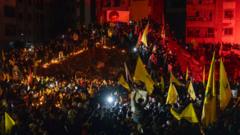Thousands of supporters gathered at the site of the assassination of Hassan Nasrallah, the former leader of Hezbollah, marking a poignant moment in the group’s history. The event served as the first public memorial at the location since the airstrike that took Nasrallah's life, illuminating the massive crater left by the September 27 attack with red lights and adorned with Hezbollah flags.
Attendees of all ages filled the area, visibly moved, as they chanted “At your service, Nasrallah,” a slogan emblematic of Hezbollah loyalties. Nasrallah, who led Hezbollah for over three decades, was viewed as a powerful symbol of resistance against Israel and an influential figure in the Middle East. His assassination shocked Lebanon and the international community, highlighting the ongoing tensions in the region.
The ceasefire agreement between Hezbollah and Israel enabled access to the area for journalists and the public for the first time, allowing crowds to gather around the crater where several residential structures once stood, now obliterated by Israeli bombardment that utilized as many as 80 bunker-busting bombs.
Amidst the crowd, some mourners held candles and photos of Nasrallah, while recorded speeches of the late leader echoed through the gathering. “We have all just been waiting to reach this place to receive his blessings,” lamented Narjis Khshaish, 31, encapsulating the deep emotional weight of the moment.
Moussa Dirani, a father attending with his teenage son, noted the painful reality of seeing the site, yet emphasized resilience: “The resistance does not stop with Nasrallah; his death gives us power to continue along his path." Similar sentiments were shared by other attendees who reiterated their commitment to the ideals of the group, showcasing solidarity in the face of adversity.
Furthermore, analysts interpret the strong turnout and emotional displays not as mere acts of grief, but as a reflection of the loyalty and ideological commitment many Hezbollah supporters express. David Wood from Crisis Group suggested that supporters perceive Hezbollah's accomplishments in military resistance as significant victories despite recent losses.
As the region continues to grapple with the implications of such high-stakes political violence, the memorial serves as a powerful reminder of the ongoing struggles faced by factions like Hezbollah and their complex relationships with both domestic and international entities.


















